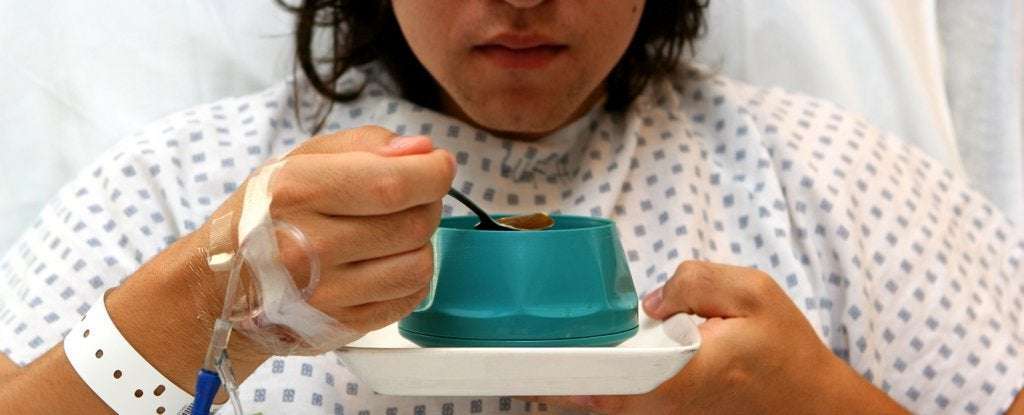People who are hospitalized with chronic heart failure should be fed fresh and balanced meals to keep their ticker in tip-top shape.
The typical tray of hospital food is not the medicine these patients need.
In Switzerland, among 645 people hospitalized with chronic heart failure, a randomized trial found those who were given regular hospital food – as opposed to a personal nutrition plan – had an almost doubled risk of mortality within 30 days.
The findings suggest the lack of nutrition found in most hospital food could be putting the health and well-being of vulnerable patients at serious risk.
"Our trial thus does not provide evidence for effects of single nutritional components," the authors explain, "but rather suggests that the overall strategy of providing nutritional support to reach different nutritional goals during a hospital stay for an acute illness is beneficial for patients with chronic heart failure."
Within two days of being hospitalized, half the patients in the trial received nutritional support from a trained registered dietician, who helped them identify and achieve their energy, protein, and micronutrient goals with individualized meals and check-ups every one or two days.
Before they were discharged, these patients also received dietary counseling and nutritional supplements if needed.
The other half of the trial group had their diet largely ignored. They received standard hospital food during their stay "according to their ability and desire to eat, with no nutritional consultation and no recommendation for additional nutritional support".
As it turns out, the two different diets were associated with significant differences in quality and quantity of life.
After 180 days, roughly a quarter of the patients who received nutritional counseling and support in hospital had died, which goes to show how serious chronic heart failure is. In comparison, however, about a third of those who had no dietary support ended up passing away in the same timeframe – a big increase.
Hospital food has a reputation for being pre-packaged and heavily processed, so this may not be a huge surprise. Instead of having a menu based on the best nutritional science, these meals are often sculpted by a desire to save money.
While this corner-cutting might prove harmless to most patients, for patients with particularly serious conditions like chronic heart failure, such a food plan could ultimately be deadly.
Eating processed and fatty foods can cause additional plaque to build up in the arteries, which puts someone at even greater risk of heart failure in the future. Evidence suggests these patients should instead be focusing on fruits and vegetables, while limiting their intake of sodium and fluids.
But while previous research has shown a lack of nutrition is especially dangerous for those with chronic heart failure, there hasn't been much research on how direct nutritional support can benefit patients.
The trial in Switzerland was conducted among a relatively small cohort and was not double-blind, but the findings nonetheless suggest nutritional advice and support within the hospital can improve a person's quality of life – and possibly even save their life, especially among those who are deemed at high risk of malnutrition.
Compared to those at moderate risk of malnutrition, the authors found patients at high risk were 65 percent more likely to die 180 days after being admitted to hospital. This was also the group that showed the most benefit from nutritional support during their hospital stay.
It's unclear how these patients kept eating once they left the hospital, but given all the patients had an average length of stay of about 10 days, the results seem to suggest that many in the nutritional support group took at least some of the advice on board.
To know for sure, though – among other things – will require more research.
"Clearly," the authors write, "there is need for additional trials validating our findings in the population of patients with chronic heart failure including also continued outpatient treatment."
The study was published in Journal of the American College of Cardiology.

mariposa654 on May 9th, 2021 at 13:25 UTC »
My father has type 2 diabetes. When he has been to the hospital they feed him total crap! White bread sandwiches and junk with orange juice on the side. His blood sugar spikes so they just control it with medicine. How completely ridiculous. It makes me so freaking mad. How can everything be like this???
EnChhanted on May 9th, 2021 at 11:08 UTC »
Wow. That's crazy! I worked as a dietary aide at our biggest local hospital. Every floor and ward had a purpose: burn, oncology, cardiac, children's, renal, ICU, labor & delivery, etc. We had VERY strict diets for some floors set by the doctor and nurses. We wouldn't even be allowed to select options on the menu for patients if they were on these floors unless the doctor manually changed the settings in our system. Like our cardiac floor could not have sodium or caffeine. Diabetic patients could not have too much sugar, natural sugar (like in certain fruit) or carbs.
binarychunk on May 9th, 2021 at 06:33 UTC »